Why are we in Afghanistan? .. Canada and the International Security Assistance Force
Mar 16th, 2006 | By Randall White | Category: Countries of the World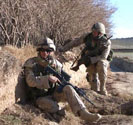 New minority Prime Minister Stephen Harper’s surprise visit to Canadian troops in Afghanistan over the past few days, it is now being said, has just stiffened the case for “a huge debate” in Canada today – “and we need to have it.” As one suitably modest place to start, just what does the international community see itself as doing in Afghanistan right now, and just how is Canada supposed to fit into the bigger picture?
New minority Prime Minister Stephen Harper’s surprise visit to Canadian troops in Afghanistan over the past few days, it is now being said, has just stiffened the case for “a huge debate” in Canada today – “and we need to have it.” As one suitably modest place to start, just what does the international community see itself as doing in Afghanistan right now, and just how is Canada supposed to fit into the bigger picture?
Coming at things in this practical way is an antidote to the local rhetorical variation on “cutting and running” and the endless “war on terror,” that has already been trotted out in Canadian domestic politics with the usual mindless emotion. Yes, without the slightest shred of doubt of course, Canadian troops are doing important good work in Afghanistan, and all the free and democratic Canadian people altogether support them, as we should.
At the same time … It is also a simple truth that the Canadian people should not be putting Canadian soldiers into much greater danger (if that is what is happening), without some clear idea of just what the practical purpose and objective is – right down on the ground of a very ancient place far away, with a long history as a turbulent “geographic location at the crossroads of Central, West, and South Asia.” Even the most recent opinion polling suggests that many Canadian people still do not feel they have this kind of clear idea.
If our troops in Afghanistan are being put in fresh danger, we need to catch up a bit with what is actually going on there. That is the best way of showing our real support and concern for what we are asking our soldiers to do. And two recent items from outside Canada are one place to begin. The first is a March 13, 2006 Associated Press report entitled “US to hand over Afghan mission to NATO.” And the second is a March 10, 2006 update of a North Atlantic Treaty Organization briefing note called “Revised operational plan for NATO ‘s expanding mission in Afghanistan.”
“US to hand over Afghan mission to NATO”
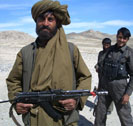 The March 13 AP report on Afghanistan outlines recent developments from a US perspective. It begins with: “The American mission to bring order to this unruly country is being handed to a multinational force led by the NATO alliance … NATO’s ambitious mission could inject the flagging European-North American alliance with a sense of purpose and also might take the heat off Washington, seen in this region as too eager to fight Muslims.”
The March 13 AP report on Afghanistan outlines recent developments from a US perspective. It begins with: “The American mission to bring order to this unruly country is being handed to a multinational force led by the NATO alliance … NATO’s ambitious mission could inject the flagging European-North American alliance with a sense of purpose and also might take the heat off Washington, seen in this region as too eager to fight Muslims.”
Canada’s new role in the region is apparently as a part of NATO’s new “ambitious mission.” (A March 15 AP report that focuses directly on recent actions of Canadian troops notes that it is “Kandahar airfield, where most of Canada’s 2,200 troops in Afghanistan are based” now. “Canada has taken over security in Kandahar from U.S. forces.”)
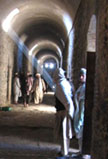 As the March 13 report also more generally explains: “NATO is already moving into Afghanistan’s rebellious southern provinces with 6,000 troops, mainly from Britain, Canada and the Netherlands. That deployment is expected to be completed in the summer and will quickly be followed by the alliance moving into the east, considered Afghanistan’s most dangerous sector.”
As the March 13 report also more generally explains: “NATO is already moving into Afghanistan’s rebellious southern provinces with 6,000 troops, mainly from Britain, Canada and the Netherlands. That deployment is expected to be completed in the summer and will quickly be followed by the alliance moving into the east, considered Afghanistan’s most dangerous sector.”
As part of this expanding role for NATO American soldiers will themselves “join the NATO force in Afghanistan” – in “a move that will subordinate U.S. troops under foreign command in a combat situation for the first time since World War II.” At the same time, “the 19,000 U.S. troops” currently “in Afghanistan will be reduced to about 16,000 by the summer. About 5,000 to 6,000 of them will go under the NATO command, aimed at maintaining stability and security. The rest will be in the separate U.S. counterinsurgency force to hunt Taliban and al-Qaida holdouts, which will remain under U.S. military command, in close liaison with NATO.”
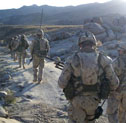 As an additional wrinkle: “U.S. B-52 bombers and A-10 ground-attack jets will remain in Afghanistan to back up both NATO and the separate U.S. force … Whether U.S. military control of Afghanistan’s airspace gets transferred to NATO has yet to be decided.”
As an additional wrinkle: “U.S. B-52 bombers and A-10 ground-attack jets will remain in Afghanistan to back up both NATO and the separate U.S. force … Whether U.S. military control of Afghanistan’s airspace gets transferred to NATO has yet to be decided.”
And then there is what would seem to be a final key point. According to U.S. Central Command chief Gen. John Abizaid “there are questions whether NATO will engage in the type of offensive operations the U.S.-led coalition has … NATO is going from the north and west that were relatively quiet to areas where there’s going to be challenges.” As another source inside Afghanistan has said, “it remains unclear whether NATO will be willing to take and inflict casualties. NATO’s limits are likely to be quickly tested by militants.”
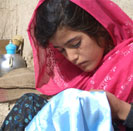 Or, to return to General Abizaid: “Not all NATO forces will be as robustly engaged’ as others, Abizaid said. Some are restricted by national rules, or caveats, from engaging in combat, crowd control and other confrontations … There will be a whole range of national capabilities displayed here and willingness to engage in tasks,’ Abizaid said. We look to minimize as many of those caveats as possible.'”
Or, to return to General Abizaid: “Not all NATO forces will be as robustly engaged’ as others, Abizaid said. Some are restricted by national rules, or caveats, from engaging in combat, crowd control and other confrontations … There will be a whole range of national capabilities displayed here and willingness to engage in tasks,’ Abizaid said. We look to minimize as many of those caveats as possible.'”
So, just to start with, where does Canada stand on these various more or less technical (but still quite important) military policy issues that seem to be still up in the air at the moment? A hasty recent TV clip of New Democrat leader Jack Layton in verbal flight, e.g., even seemed to raise some doubts about whether Canadian troops were finally “under the NATO command, aimed at maintaining stability and security” – or part of “the separate U.S. counterinsurgency force to hunt Taliban and al-Qaida holdouts, which will remain under U.S. military command, in close liaison with NATO.” And presumably it won’t do anyone any good if Canada just starts to acquire the reputation “in this region as too eager to fight Muslims” that has apparently already damaged the “stability and security” efforts of US troops.
“Revised operational plan for NATO ‘s expanding mission in Afghanistan”
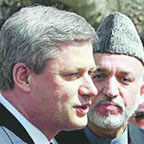 One thing to be clear on, no doubt, is that Canadian troops in Afghanistan would be in the same new situation they are in today even if Stephen Harper’s Conservatives had not managed to win a slender minority government on January 23, 2006. Paul Martin’s previous Liberal minority government had already agreed to what a March 10, 2006 update of a North Atlantic Treaty Organization briefing note calls “a revised Operational Plan … which will guide the NATO-led International Security Assistance Force (ISAF) to assist the Afghan Government to extend and exercise its authority and influence across the country” – formally endorsed at a December 8, 2005 meeting of NATO Foreign Ministers in Brussels.
One thing to be clear on, no doubt, is that Canadian troops in Afghanistan would be in the same new situation they are in today even if Stephen Harper’s Conservatives had not managed to win a slender minority government on January 23, 2006. Paul Martin’s previous Liberal minority government had already agreed to what a March 10, 2006 update of a North Atlantic Treaty Organization briefing note calls “a revised Operational Plan … which will guide the NATO-led International Security Assistance Force (ISAF) to assist the Afghan Government to extend and exercise its authority and influence across the country” – formally endorsed at a December 8, 2005 meeting of NATO Foreign Ministers in Brussels.
In fact, it seems clear enough that former Liberal foreign minister Pierre Pettigrew did not actually attend the December 8 meeting in Brussels. He does not appear to be in the official photograph of the NATO foreign ministers who were present – presumably because he also reportedly gave a speech at an international climate change conference in Montreal on the same day. By this point of course the latest Canadian federal election campaign had already begun, and virtually all Canadian politicians (and journalists) were preoccupied with that.
 (Or, as the Globe and Mail‘s John Ibbitson has now aptly summarized the real situation: “It is perfectly clear that many Canadians feel they were not properly informed of the risks and obligations in the Kandahar deployment. That is the fault of the previous government, the opposition parties and the media, none of which paid sufficient attention.”)
(Or, as the Globe and Mail‘s John Ibbitson has now aptly summarized the real situation: “It is perfectly clear that many Canadians feel they were not properly informed of the risks and obligations in the Kandahar deployment. That is the fault of the previous government, the opposition parties and the media, none of which paid sufficient attention.”)
Assuming that it is still “the NATO-led International Security Assistance Force (ISAF)” that Canada is supposed to be a part of (and not “the separate U.S. counterinsurgency force to hunt Taliban and al-Qaida holdouts, which will remain under U.S. military command” – aka “Operation Enduring Freedom”), the new plan outlined in the March 10 update of the NATO briefing note still seems a rather mushy and uncertain concept .
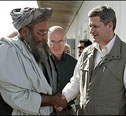 Just what, e.g., are ordinary concerned Canadian voters to make of the following diplomatic boilerplate: “The Plan addresses the tasks and challenges ISAF will face as it continues to expand its area of operations to the south and subsequently to the east of the country … It provides the strategic focus to create the conditions for stabilisation and reconstruction across the country. It recognizes the primacy of the Afghan Government and the paramount importance of continued, coherent and consistent development of Afghan political institutions and security capability. In addition, it outlines clear arrangements for enhanced coordination and deconfliction between ISAF’s stabilisation mission and the Coalition counter-terrorism mission. It also highlights the need for ISAF to cooperate effectively with the other key international community agencies in Afghanistan, notably the UN, the EU, the G8 lead nations and the NGO community.”
Just what, e.g., are ordinary concerned Canadian voters to make of the following diplomatic boilerplate: “The Plan addresses the tasks and challenges ISAF will face as it continues to expand its area of operations to the south and subsequently to the east of the country … It provides the strategic focus to create the conditions for stabilisation and reconstruction across the country. It recognizes the primacy of the Afghan Government and the paramount importance of continued, coherent and consistent development of Afghan political institutions and security capability. In addition, it outlines clear arrangements for enhanced coordination and deconfliction between ISAF’s stabilisation mission and the Coalition counter-terrorism mission. It also highlights the need for ISAF to cooperate effectively with the other key international community agencies in Afghanistan, notably the UN, the EU, the G8 lead nations and the NGO community.”
The very bottom line would seem to be that, as matters stand, the international community still has a rather diffuse and open-ended notion of just what it is doing in Afghanistan right now. Between now and early next year (the apparent initial time frame for Canada’s current expanded commitments) different national participants in ISAF’s stabilisation mission would appear to have some considerable leeway in carving out exactly what their longer-term role in the region will be. Canadian politicians and the Canadian people owe it to their soldiers to ensure that the role Canada carves out for itself makes practical sense – and contributes realistically to enhanced international security in the challenging new global village of the 21st century. There is an undeniably strong case for some kind of “huge debate” on this subject in Canada today. And one way or another, we do “need to have it.” Vague rhetoric about never “cutting and running” in an endless “war on terror” is no longer cutting the mustard, even among our very good friends, neighbours, and relatives next door.
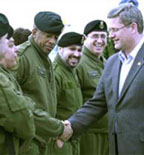 The counterweights editors will be continuing to report on sources that shed interesting and helpful light on the current troubled situation in Afghanistan, and the increasingly dangerous hard work of the Canadian forces there, over the weeks and months ahead. Meanwhile, a review of several recent books by and about Osama bin Laden, by Charles Glass in the 9 March 2006 London Review of Books, offers some provocative insight on both why the situation is as troubled as it is – and why it also no doubt does remain important for the international community to stay as constructively and realistically involved as it can manage to be.
The counterweights editors will be continuing to report on sources that shed interesting and helpful light on the current troubled situation in Afghanistan, and the increasingly dangerous hard work of the Canadian forces there, over the weeks and months ahead. Meanwhile, a review of several recent books by and about Osama bin Laden, by Charles Glass in the 9 March 2006 London Review of Books, offers some provocative insight on both why the situation is as troubled as it is – and why it also no doubt does remain important for the international community to stay as constructively and realistically involved as it can manage to be.

